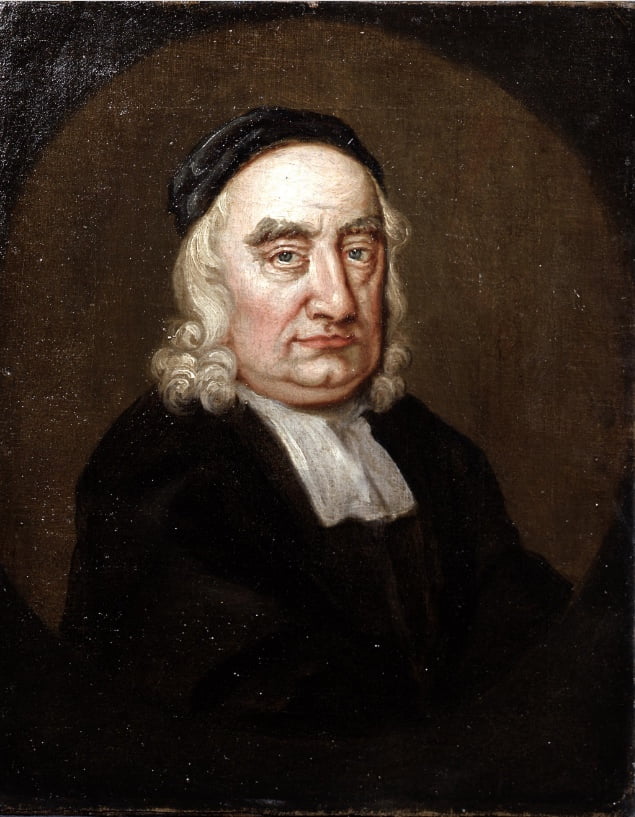Jonathan Swift’ reply to Francis Grant, on a proposed Anglo-Irish herring fishery scheme (There is not virtue enough left among mankind)
SWIFT, JONATHAN

The works of Jonathan Swift – Tale of a Tub, Gulliver’s Travels, A Modest Proposal and more- are close to the herripedia’s heart. How is it I didn’t know of his Letter to Francis Grant Esq; on the herring fishery?
The United Kingdom of the C18th was awash with pamphlets proposing herring fishery schemes. Incompetence, corruption, bad practices, chronic underachievement, combined with the Netherlands’ notable history of wealth generation out of the herrings in British waters, provided fertile ground. The underdevelopment of Irish herring fisheries was even more marked.
In 1734, Francis Grant had written to Swift, Dean of St Patrick’s Cathedral, Dublin, soliciting his support for a proposed fishery scheme, presented as of particular benefit to the Irish people:
…Though I am not a native of Ireland, I have always regarded it as so connected with this country, that the natives of both islands ought mutually to study and advance the advantage of each other, And it is in consequence of this principle that I offer to your consideration, that your countrymen should heartily engage in and pursue the white herring, and cod fishing. This is a branch of trade which Providence has given opportunity to follow in both countries; neither can they prejudice one another, as there may be consumption for all that may be caught on both islands. There is nothing that would so effectually employ your poor, and prevent their going abroad, considering the great variety of trades necessary in this undertaking; it would also increase the consumption of your home manufactures, and increase the balance of your foreign trade.
The north and north-east parts of your island lie exceedingly well, both for the cod and herring fishing, as will appear to you from their course, which is described in the inclosed pamphlet, if you take the trouble to look upon it; but encouragements are necessary to support a new undertaking in its infancy, because they are always, at the beginning, liable to charges and inconveniences, which discourage private adventurers, if not supported by the public. I have with great pleasure read, in the minutes of your parliament, of late years, several instances of their zeal for their country’s good, which inclines me to believe they would readily receive and encourage a proposition of this nature, if properly introduced and recommended to them; and I shall reckon it a particular good fortune, If I could suggest what would be acceptable to you and them…
Letters written by the Late Jonathan Swift DD, 1703 to 1740, Vol II (1766)
Francis Grant may or may not have known of Swift’s previous interest in the herring fishery. His assessment of Swift’s influence was almost certainly based on the success of Drapier’s Letters (1724 – 25) referred to in the reply as his writing against a project of one Wood, an ironmonger, to coin 100,000l. Grant published an abridged version of Swift’s reply in a further herring fishery pamphlet of 1750.
Swift’s reply (unabridged)
TO FRANCIS GRANT, ESQ., MERCHANT IN LONDON.
SIR,
DUBLIN, MARCH 23, 1733-4.
I RETURN you my hearty thanks for your letter, and discourse upon the fishery: you discover, in both, a true love of your country, and (excepting your civilities to me) a very good judgment, good wishes to this ruined kingdom, and a perfect knowledge in the subject you treat. But you are more temperate than I, and consequently much wiser: for corruptions are apt to make me impatient, and give offence, which you prudently avoid.
Ever since I began to think, I was enraged at the folly of England, in suffering the Dutch to have almost the whole advantage of our fishery, just under our noses.
The last lord Wemys told me, he was governor of a castle in Scotland near which the Dutch used to fish: he sent to them, in a civil manner, to desire they would send him some fish, which they brutishly refused; whereupon he ordered three or four cannon to be discharged from the castle, (for their boats were in reach of the shot;) and, immediately, they sent him more than he wanted.
The Dutch are like a knot of sharpers among a parcel of honest gentlemen, who think they understand play, and are bubbled of their money. I love them for the love they have to their country; which, however, is no virtue in them, because it is their private interest, which is directly contrary in England. In the queen’s time, I did often press the lord treasurer Oxford, and others of the ministry, upon this very subject; but the answer was, “We must not offend the Dutch;” who, at that very time, were opposing us in all our steps toward a peace. I laughed to see the zeal that ministry had about the fishing at Newfoundland, (I think) while no care was taken against the Dutch fishing just at our doors.
As to my native, I happened indeed, by a perfect accident, to be born here, my mother being left here from returning to her house at Leicester, and I was a year old before I was sent to England: and thus I am a Teague, or an Irishman, or what people please, although the best part of my life was in England.
What I did for this country was from perfect hatred of tyranny and oppression, for which I had a proclamation against me of 300l. which my old friend my lord Carteret was forced to consent to, the very first or second night of his arrival hither. The crime was that of writing against a project of one Wood, an ironmonger, to coin 100,000l. in halfpence, not worth a sixth part of the money, which was laid before the people in so plain a manner, that they all refused it; and so the nation was preserved from immediate ruin.
I have done some smaller services to this kingdom, but I can do no more. I have too many years upon me, and have too much sickness. I am out of favour at court, where I was well received, during two summers, six and seven years ago. The governing people here do not love me. For as corrupt as England is, it is a habitation of saints in comparison of Ireland. We are sl—s, and kn—s, and fools; and all, but bishops and people in employments, beggars. The cash of Ireland does not amount to 200,000l.: the few honest men among us are deadhearted, poor, and out of favour and power.
I talked to two or three gentlemen of this house of commons, now sitting here; and, mentioning your scheme, showed how very advantageous it would be to Ireland. They agreed with me; but said, that if such a thing were proposed, the members would all go out, as at a thing they had no concern in.
I believe the people of Lapland, or the Hottentots, are not so miserable a people as we; for oppression, supported by power, will infallibly introduce slavish principles. I am afraid that, even in England, your proposal will come to nothing. There is not virtue enough left among mankind. If your scheme should pass into an act, it will become a job: your sanguine temper will cool: r——s will be the only gainers. Party and faction will intermingle, and defeat the most essential parts of the whole design. Standing armies, in times of peace; projects of excise, and bribing at elections, are all you are like to be employed in; not forgetting septennial parliaments, directly against the old whig principles, which always have been mine.
A gentleman of this kingdom, about three years ago, joined with some others in a fishery here, in the northern parts: they advanced 200l. by way of trial: they got men from Orkney to cure their fish, who understood it well. But the vulgar folks of Ireland are so lazy and so knavish, that it turned to no account, nor would any body join with them: and so the matter fell, and they lost two thirds of their money. Oppressed beggars are always knaves; and, I believe, there hardly are any other among us. They had rather gain a shilling by knavery, than five pounds by honest dealing. They lost 30,000l. a year for ever in the time of the plague at Marseilles, when the Spaniards would have bought all their linen from Ireland: but the merchants and the weavers sent over such abominable linen, that it was all returned back, or sold for a fourth part of the value. This is our condition, which you may please to pity, but never can mend. I wish you good success with all my heart. I have always loved good projects, but have always found them to miscarry. I am, sir, with true esteem for your good intentions,
Your most obedient servant.
P. P. I would subscribe my name, if I had not a very bad one; so I leave you to guess it. If I can be of any service to you in this kingdom, I shall be glad you will employ me.
Acknowledgments
I came across Swift’s letter to Francis Grant in John Mitchell’s The Herring: Its Natural History and National Importance (1864). It was also abridged. I found the complete text in Wikisource. I found the text of Francis Grant’s letter to Swift at the Internet Archive scan of the credited book of Swift’s letters.
See also
- BRITISH FISHERY
- BUSS
- DIVINE PROVIDENCE
- DUMAS ON HERRING
- DUTCH GRAND FISHERY
- ENGLAND’S PATH TO WEALTH AND HONOUR
- HARENG SAUR MONOLOGUES
- HERRING BUSS (TUNE)
- HERRING INDUSTRY BOARD
- LOCKMAN, JOHN
- LOCKMAN’S VAST IMPORTANCE
- NASHES LENTEN STUFFE
- NEUCRANTZ: ON HERRING (1654)
- PARA HANDY
- PICKELHERING
- RED HERRING JOKE, THE
- WILLIAMS, WILLIAM CARLOS: FISH
